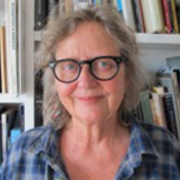
Dorthe Scheffmann
Dorthe Scheffmann grew up in Taranaki and Waikato, after her family moved down under from Denmark when she was a child. As an immigrant, she found herself watching life with an outsider's eye: "I watched my way to adulthood".
Scheffmann started her long film career on Sleeping Dogs, which arguably launched the late 70s New Zealand film renaissance. Over the following decade she would amass credits on a range of seminal Kiwi films, including in continuity, props, and as assistant director, production manager and production supervisor.
Working in continuity on classic road movie Goodbye Pork Pie, Scheffmann fell in love with the country, "and came to understand something of what being a New Zealander is all about. It was the moving through New Zealand at the rate we did — from top to bottom and back again, and everyday watching great actors do what they do, from Kelly Johnson to Marshall Napier's West Coast traffic cop to John Bach's junkie".
In 1980 Scheffmann worked as production manager on her first feature, the ambitious historical drama Pictures. She went on to production manage Smash Palace and Carry Me Back, then collaborated with Smash Palace associate producer Larry Parr, production supervising on another three features.
She was also renting out lighting equipment for movies, having formed lighting company Streetlight Production with her then partner, cameraman Stuart Dryburgh. In 1985 she produced a number of music videos, including Peking Man's computer-animated trailblazer Room that Echoes, and gave birth to oldest son Tomas Dryburgh.
Two years later — the same year Dorthe gave birth to second child Isobel — Scheffmann formed company This is it Limited, with director Gregor Nicholas. Over the next nine years she managed the company as it produced a line of award-winning commercials, and classic Nicholas-directed short Avondale Dogs.
She was also involved in developing stage and screen classic The End of the Golden Weather on its long path to the screen, pitching the project at the 1990 Cannes Film Festival, before withdrawing after the birth of son Emil.
In an unusual case of cocktails fuellng filmmaking, Scheffmann and Dryburgh launched Ponsonby Road restaurant and bar SPQR in 1992. The aim was to create an income stream to develop films. SPQR, which they sold in 1995, helped fund Scheffmann’s first short films as a director: The Beach and The Bar.
The two films are very different. The Beach revolves around seaside revelations between two longtime friends (Donogh Rees and Elizabeth Hawthorne). It reflected Scheffmann’s longtime interest in "putting women and their lives on the screen". The result was invited to compete at Cannes, and won an award at the 1996 Hamburg Short Film Festival.
Scheffmann and writer Frances Edmond worked to keep the script’s dialogue to a naturalistic minimum. The Bar, by contrast, revolves around a series of conversations by patrons at a bar. The ensemble tale tested Scheffmann’s view that a film should be paced as much by character development as narrative.
After shooting both films, she spent time in Denmark, where she completed post-production of The Bar. Upon returning to New Zealand she concentrated on "mothering and forwarding my own work". The film work included her third short, returning home tale A Funeral, plus six shorts which she shepherded through development for the NZ Film Commission (with partners Riwia Brown and Kara Paewai). Among them were award-winners Still Life and Cow.
Between 1999 and 2004 Scheffmann directed commercials (some of them award-winners) for her company This is it, as well as for Michele Fantl’s MF Films. She also line-produced MF feature 50 Ways of Saying Fabulous.
Since directing her first short films Scheffmann has had an interest in women's cinema. This was reflected in her Master of Philosophy thesis 'A Feminine Language in Cinema', which provided the opportunity to write a manifesto for the making of films for a women's audience. She has a Masters of Art Management, also from Auckland University of Technology.
In February 2017 she began shooting her first feature as writer, director and producer. November 2018, Vermilion stars a group of "mothers, daughters, friends and neighbours", including Jennifer Ward-Lealand, Goretti Chadwick, Teresa Healey and Emily Campbell. Scheffmann calls the film "a meditation on life, death and the strength of family and friends in a summer of crisis, which celebrates love and generosity in a richly female-centred household". In a five star review, Metro's David Larsen found the result wise and moving, and applauded the many "strong, complex, well-realised women".
Ward-Lealand plays a musician whose daughter is set to marry. Behind the scenes, the production team were 85 per cent female. Scheffmann was keen that her film speak to a group that are avid moviegoers, yet are rarely represented in Kiwi films: women over 50.
Seeking a better way to work, Scheffmann avoided the common system of shooting a movie in one concentrated burst. Instead Vermilion was filmed in five blocks, with a week for rehearsals and editing between each block of filming.
Back in 2005, Scheffmann began working in Auckland University’s Department of Film and Media Studies, as a Masters Supervisor (she has also lectured in film at Unitec in Auckland). She has supervised many Masters film projects.
Scheffmann has also brought her wide experience to bear as a consultant on the ‘feminine’, in advertising campaigns aimed at a female audience.
Updated on 14 February 2021
Sources include
Dorthe Scheffmann
David Larsen, 'The real thing' (Review of Vermilion) - Metro, November 2018
Richard Raskin,‘The Beach: An interview with Dorthe Scheffmann’ - p.o.v issue 3, March 1997
Unknown writer, 'Jennifer Ward-Lealand leads ensemble cast in feature film' (Press release) NZ Film Commission website. Loaded 20 February 2017. Accessed 31 October 2018
Vermilion press kit